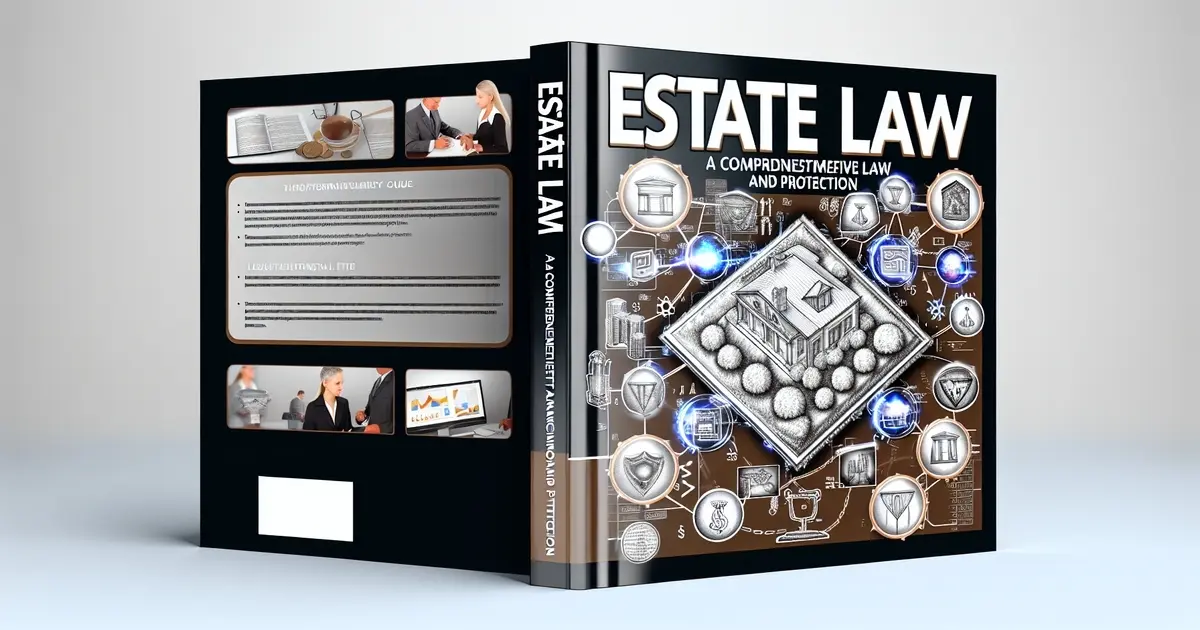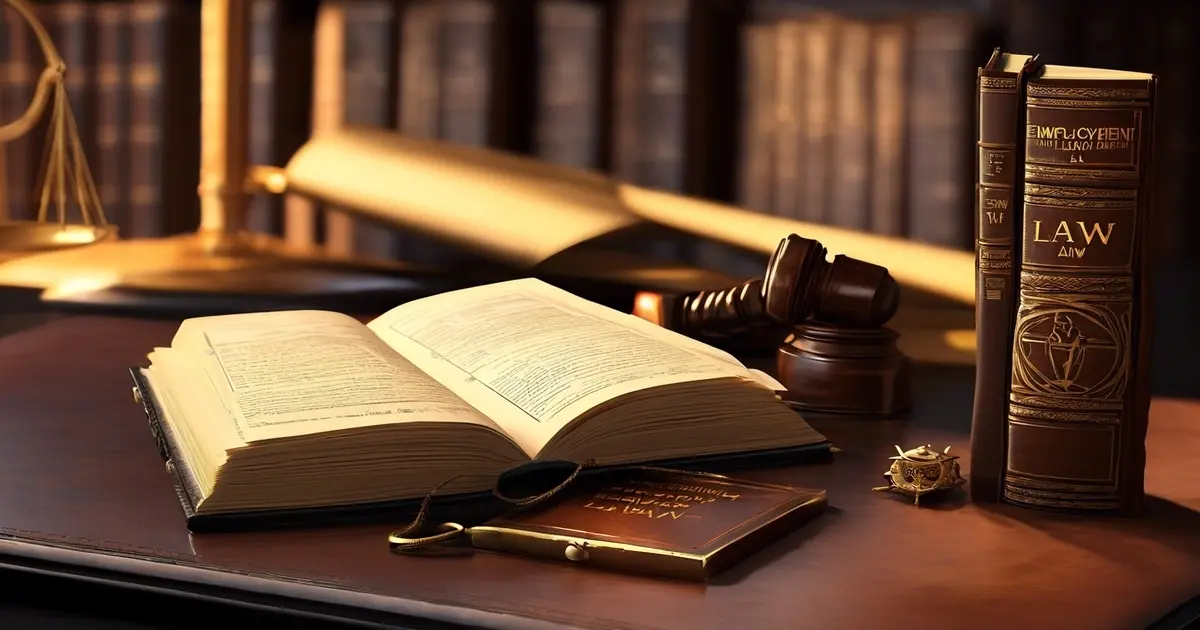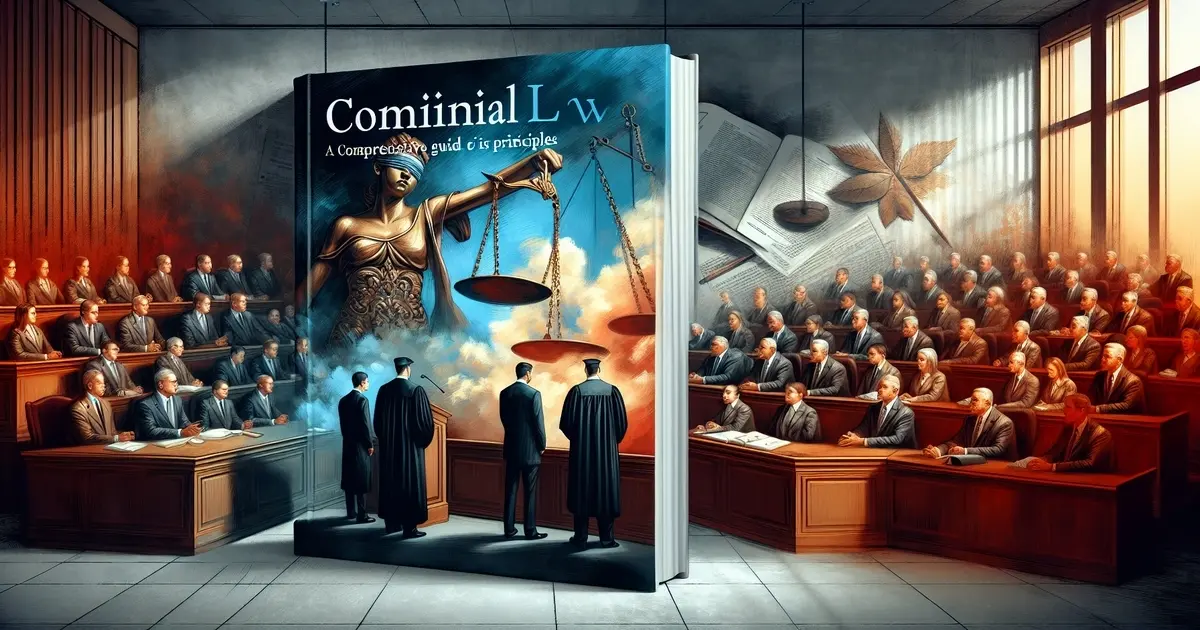Estate Law: A Comprehensive Guide to Planning and Protection
Encompassing guardianship, court power, and litigation, estate law might seem like a tangled web of confusing terms and endless paperwork. Still, it's your secret weapon in ensuring your wishes are honored and your loved ones are cared for. While many people shy away from diving into estate planning, fearing it's all about grim predictions, legal jargon, and potential court litigation, those clients who embrace it find a powerful tool for safeguarding their future.
This blog post peels back the curtain on estate law, breaking down its complexities into digestible insights for clients, including court processes and litigation, to help people understand. Whether you're aiming to draft a will or navigate probate processes, understanding the basics of estate law can transform how individuals plan for what lies ahead.
Table Of Contents
Understanding Estate Law Basics and Definitions
Asset Types
Estate law views assets in two main categories: tangible and intangible. Tangible assets are physical items. These include houses, cars, and jewelry. Intangible assets aren't physical. They're rights or interests like stocks or copyrights.
Tangible assets fall under real property or personal property in common law discussions. Real property refers to land and things attached, such as a house. Personal property is everything you can own that isn't land or tied to land.
Intestacy Laws
When someone dies without a will, intestacy laws come into play. These laws decide how a person's estate gets divided among surviving relatives. The rules vary by location but aim to distribute the deceased person's estate fairly among clients.
Without a will, the court follows a predefined order of heirs, starting with spouses and children and then moving outwards to more distant relatives if necessary. This process highlights the importance of having a will for precise control over their estate distribution for clients.
Guardianship Roles
Guardianship is crucial in estate planning when dependents are involved. It appoints someone responsible for managing the affairs of minors or incapacitated adults within an estate context.
The guardian takes care of personal well-being decisions for their ward while possibly managing any inherited properties until they reach adulthood or regain capacity.
In everyday law contexts, understanding these basics helps navigate estates' legal landscapes effectively, whether dealing with inheritance issues or planning one’s estate.
- An individual's net worth at any given point reflects their "estate" in legal terms.
- This includes all owned properties minus any owed liabilities.
- The term has special significance concerning bankruptcy proceedings and inheritance matters.
- In real estate discussions, it often pertains specifically to land ownership issues.
Civil law jurisdictions might use "patrimony" instead but share similar concepts regarding asset management after death.
Components of Estate Planning: Wills, Trusts, and Beyond
Will Necessity
A will stands as a crucial document in estate planning. It guides the distribution of your assets after you pass away. Without it, state laws decide who gets what. This can lead to unexpected outcomes.
Writing a will lets you control who inherits your possessions. You can ensure that your children, partner, or favorite charity receives specific items. It's about making decisions now for the future.
Trust Types
Trusts are another critical part of estate planning. They hold assets for beneficiaries under the terms you set up. There are two main types: revocable and irrevocable.
Revocable trusts let you keep control over your assets during your lifetime. You can change or cancel the trust anytime before death. Irrevocable trusts transfer ownership from you to the trust permanently. This means less control but offers benefits like protection from creditors and reduced estate taxes.
Both types have their place in estate planning, depending on individual needs and goals.
Additional Tools
Beyond wills and trusts, other tools play vital roles in estate plans:
- Life insurance provides financial security for those left behind.
- Retirement accounts also form part of an estate plan; they often have designated beneficiaries outside a will or trust.
Each tool serves different purposes:
- Life insurance helps cover debts and living expenses for survivors.
- Retirement accounts offer continued income or lump-sum payments to named individuals upon death.
Utilizing various tools ensures comprehensive coverage across all aspects of one’s life and beyond.

Navigating State and Federal Laws Governing Estates
State Variations
Estate law differs significantly across states. Each state has its own set of rules for handling estates, including how wills are validated, how assets are distributed if there's no will, and who can serve as an executor or personal representative. For example, some states require a witness to be present when signing a will, while others do not.
These variations mean that what works in one state might not work in another. Individuals must understand their state's laws to ensure their estate plan is effective. This knowledge helps avoid potential litigation and ensures the smooth execution of their wishes upon death.
Federal Influence
Federal laws primarily impact estate taxation. The United States imposes taxes on large estates before distribution to heirs. However, as of recent years, most people will only be affected by federal estate taxes if their estate exceeds a certain value threshold - several million dollars.
Understanding these tax implications is vital for planning purposes. Strategies like gifting parts of an estate during one's lifetime can significantly reduce the taxable portion of an estate at death. This requires careful planning and understanding of both federal laws and any applicable state taxes on inheritance or estates.
Domicile Importance
The concept of domicile plays a critical role in estate planning because it determines which state’s laws apply to your estate upon death. Your domicile is your legal residence; it’s where you intend to return, even if you temporarily live elsewhere.
Knowing your domicile affects many aspects:
- Which state’s probate court has jurisdiction over your estate
- The applicable state tax rates
- Potential eligibility for homestead exemptions
For those with homes in multiple states or who spend significant time outside their home state, establishing clear evidence of domicile is essential to avoid disputes after death concerning which state's laws govern the disposition of their assets.
The Probate Process Explained
Probate Basics
Probate is a court-supervised process. It validates wills and ensures the deceased's assets are distributed correctly. This step is crucial after navigating state and federal estate laws.
The court examines the will for authenticity. They appoint an executor to manage the estate. This person pays debts and distributes assets as the will directs.
Timeline Overview
The probate timeline varies widely. It depends on many factors, including estate size and complexity.
Generally, probate can take from several months to over a year. Simple estates might wrap up quicker, while larger ones take longer due to detailed asset distribution.
Common Hurdles
Several hurdles can slow down probate proceedings:
- Disputes among heirs: When beneficiaries disagree with the will's terms or execution.
- Complex assets: Real estate in different states or business interests complicate matters.
- Debts exceeding assets: Solving how to pay debts when the estate lacks sufficient funds requires careful management.
To illustrate these points, consider this example: An individual leaves behind a large estate that includes properties across multiple states, various stock portfolios, and numerous debts. The executor faces challenges such as validating property titles in different jurisdictions, liquidating stocks without causing market disruptions, and negotiating with creditors about which debts get paid first.
Powers of Attorney and Advance Health Care Directives
Financial Authority
Powers of attorney (POA) are legal tools. They let someone make decisions for you if you can't. There are two main types: financial and healthcare.
Financial POAs give a person, your agent, the ability to handle your money matters. This includes paying bills, managing investments, or even selling property on your behalf. Choosing someone trustworthy is crucial, as financial mismanagement can have serious consequences.
When setting up a financial POA, be clear about what powers you're granting. You might allow them to do everything or limit their actions. For instance, they could pay everyday expenses but only sell your home with further permission.
Health Decisions
Healthcare POAs work differently from financial ones. They focus on medical choices instead of money issues.
With a healthcare POA, you appoint an agent to make health-related decisions if you cannot communicate your wishes. This is where advanced health care directives come in handy, too.
Advance directives outline specific medical treatments you do or don't want under certain conditions—like life support if there's no hope of recovery. These documents guide doctors and loved ones during tough times.
Choosing Agents
Selecting agents for both types of POA is critical.
For financial matters:
- Pick someone with sound judgment.
- Ensure they understand their responsibilities.
- Trust is critical; consider family members or close friends who know you well.
For healthcare decisions:
- Choose someone who respects your views on medical care.
- Please make sure they're comfortable discussing sensitive topics.
- They should be willing and able to advocate for your wishes in stressful situations.
The Role of Executors and Trustees in Estate Management
Executor Duties
Executors play a crucial role in estate law. They ensure that a deceased person's final wishes are honored. Their responsibilities begin with will validation. This process confirms the will's legality.
After validating the will, executors must identify all assets. They list everything from real estate to personal belongings. Next, they pay off any debts and taxes owed by the estate.
Finally, executors distribute assets to beneficiaries as specified in the will. This step requires careful attention to detail and fairness.
Trustee Responsibilities
Trustees manage trust assets for beneficiaries' benefit according to the trust document. Their job starts with understanding all terms outlined in this document.
Trustees then invest and manage trust assets wisely. They aim for growth while minimizing risk. Regular reports keep beneficiaries informed about the status of their investments.
Trustees also make distributions according to the trust terms. These could be regular payments or specific conditions like funding education costs.
Conflict Mitigation
Conflicts of interest can arise during estate management.
- Executors might favor particular beneficiaries over others.
- Trustees may have personal interests conflicting with their duties.
To mitigate these issues:
- Clear communication is critical.
- Professional advisors can offer impartial guidance.
- Regular audits ensure transparency.
Executors and trustees should prioritize their client's best interests above their own.
Asset Protection and Fiduciary Ethics in Estate Planning
Shielding Assets
Asset protection is a vital part of estate planning. It helps keep your assets safe from creditors and lawsuits. This means finding legal ways to make it hard for others to take what you've worked hard for.
One common strategy is setting up trusts. Trusts can offer a strong shield for your assets. They ensure that your wealth goes where you want after you pass away, not to settle debts or legal disputes.
Another method involves owning property jointly. If done right, this can limit creditors' access to the property because just one person does not possess it.
However, asset protection needs careful planning. It would be best to act long before any claims or lawsuits arise. Doing this too late might be seen as fraud.
Fiduciary Duties
Fiduciaries have essential roles in managing someone else's money or property. Their duties include loyalty and prudence, among others.
Loyalty means putting the interests of the estate above their gains. For example, they should only use estate assets for their benefit with explicit permission.
Prudence involves making decisions carefully with the estate's best interest in mind. This could mean investing wisely or choosing when to sell an asset based on market conditions.
These responsibilities are crucial in avoiding conflicts of interest and ensuring that estates are managed effectively and ethically.
Ethical Pitfalls
Estate planning has its share of ethical challenges:
- Conflict of Interest: Executors might face situations where their interests clash with their duty towards the estate.
- Mismanagement: Poor decision-making can lead to financial losses for heirs.
Avoiding these pitfalls requires awareness and integrity from everyone involved in estate management.
To maintain high ethical standards:
- Always prioritize transparency with all parties involved.
- Seek professional advice when facing complex decisions.

Considerations for Hiring an Estate Lawyer
Qualifications Check
When seeking an estate lawyer, their qualifications are your first checkpoint. You want someone who's knowledgeable and has the proper credentials.
Look for a law degree from a reputable institution and a license to practice in your state. Specialization in estate law is a big plus. This shows they have deep knowledge in this area.
Also, check if they're members of professional associations related to estate planning or law. Membership often means they're committed to staying updated on their field's latest developments and ethics.
Experience Matters
Experience is critical when choosing an estate lawyer. Ask about the types of estates they've handled. More complex cases mean more experience.
Please find out how long they've been practicing estate law specifically. Years matter because laws change, and you need someone up-to-date.
Ask them directly about any similar cases they've worked on before. This gives you insight into their hands-on experience with situations like yours.
Fee Structure
Understanding how lawyers charge will help you manage your budget better. Most estate lawyers work on an hourly rate or flat fee basis. Ask which one applies and get estimates based on your case's complexity.
Some might offer free initial consultations; take advantage of this to gauge compatibility without committing financially. Knowing these details upfront prevents surprises later regarding legal costs.
Complex Estates Need Expert Advice
Expert legal advice becomes crucial when estates involve multiple assets and businesses across different states or countries. Complex tax issues may arise, requiring specialized knowledge only experienced estate lawyers possess.
If heirs live abroad or there are disputes among beneficiaries, navigating these challenges smoothly necessitates professional guidance. It ensures fairness while adhering strictly to legal standards and minimizing potential conflicts.
The Impact of Federal Estate and Gift Taxes on Planning Concerns for Beneficiary and Guardianship Court
Exemption Thresholds
The federal estate tax plays a significant role in estate planning. It's all about how much your estate is worth when you pass away. A limit, or "exemption threshold,” changes pretty often. You won't owe any federal estate taxes if your estate’s value is below this limit.
For example, the exemption has recently been set at several million dollars. This means most people won't have to worry about it. But for those with larger estates, understanding this threshold is crucial. It helps them plan better and possibly reduce their future tax burden.
Gift Tax Exclusions
Another strategy involves annual gift tax exclusions. You can give a certain amount of money to as many people as you like each year without these gifts counting toward your taxable estate size.
This amount changes, but consider it a way to gradually transfer wealth without hitting significant tax penalties later. For instance, parents might use this strategy to help their children financially while reducing their taxable estate's size over time.
Marital Deductions
Marital deductions are another critical area in estate law planning. When one spouse passes away, they can leave unlimited assets to the surviving spouse without facing federal estate taxes.
This doesn't mean taxes are avoided forever, but it does delay potential taxation until after both spouses have passed away. It's an important consideration for couples trying to protect the financial well-being of the survivor.
Summary
Estate law might seem like a maze, but you've easily navigated through twists and turns. From grasping the basics to understanding the complexities of wills, trusts, and taxes, you're better equipped to tackle estate planning head-on. Remember, it's not just about dotting the i's and crossing the t's; it's about securing your legacy and ensuring your loved ones are cared for.
So, what's next? Don't let this newfound knowledge gather dust. Take action! Whether it's updating your will, setting up a trust, or simply chatting with an estate lawyer, make your move. Your future self (and your family) will thank you for it. Estate planning might not be the most thrilling ride in the amusement park of life, but it is one of the most important. Let's get cracking!
Frequently Asked Questions
What are the basics of estate law?
Estate law involves managing a person's assets and liabilities after they pass away. It includes creating wills, setting up trusts, and ensuring smooth asset transfer to beneficiaries.
How do wills and trusts differ in estate planning?
Will specify your wishes for asset distribution upon death. Trusts manage assets during life and beyond, offering more control and privacy than wills.
What's the deal with probate?
Probate is the legal process of verifying a deceased person’s will. It can be lengthy but ensures the lawful distribution of assets according to the will or state laws if there's no will.
Why are powers of attorney necessary in estate planning?
Powers of attorney allow someone you trust to make decisions on your behalf if you cannot, covering both financial matters and health care decisions.
Under transactional law and court oversight, what roles do executors and trustees play in managing an estate, guardianship, and beneficiary interests?
Executors carry out your wishes as outlined in your will. Trustees manage any trusts you've set up, focusing on long-term asset management for beneficiaries.
Can hiring an estate lawyer make a difference?
Absolutely! An experienced estate lawyer navigates complex laws to protect your interests, ensuring efficient asset transfer while minimizing taxes and legal hurdles.
How does federal tax impact my estate planning strategy?
Federal estate and gift taxes can significantly affect how much of your wealth gets passed on. Strategic planning helps minimize these taxes, maximizing what goes to loved ones or charities.
Related Post
Immigration Law
Immigration law, a complex web of issues including naturalization that has evolved significantly over centuries, is one of the most discussed topics worldwide, particularly in the United States, affecting numerous persons.
Read MoreEmployment Law
Did you know that over 60% of Americans know their rights and responsibilities under employment law, including specific jobs, minimum wages, federal minimum, and unions?
Read MorePersonal Injury Law
Navigating the complexities of personal injury law, court decisions, and alternative dispute resolution can feel like trying to find your way out of a labyrinth without a map for the injured party, emphasizing the importance of reasonable care.
Read MoreCriminal Law Explained
Have you ever wondered what keeps the wheels of justice turning? Criminal law, guided by the prosecutor and attorney, serves as the backbone, ensuring fairness and safety in society by evaluating the guilty mind and determining the appropriate sentence.
Read MoreCorporate Law
In the fast-paced world of modern corporations and businesses, understanding corporate law, limited liability, and company structure can feel like reading a map with no legend for many corporations.
Read MoreFamily Law
We have always wondered how the tangled web of family dynamics can be legally navigated in many states and articles worldwide through committees.
Read More






